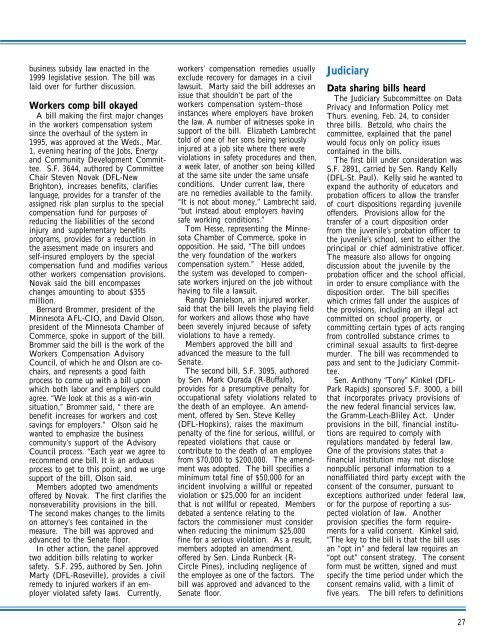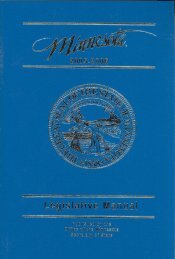Committee update - Minnesota State Legislature
Committee update - Minnesota State Legislature
Committee update - Minnesota State Legislature
Create successful ePaper yourself
Turn your PDF publications into a flip-book with our unique Google optimized e-Paper software.
usiness subsidy law enacted in the<br />
1999 legislative session. The bill was<br />
laid over for further discussion.<br />
Workers comp bill okayed<br />
A bill making the first major changes<br />
in the workers compensation system<br />
since the overhaul of the system in<br />
1995, was approved at the Weds., Mar.<br />
1, evening hearing of the Jobs, Energy<br />
and Community Development <strong>Committee</strong>.<br />
S.F. 3644, authored by <strong>Committee</strong><br />
Chair Steven Novak (DFL-New<br />
Brighton), increases benefits, clarifies<br />
language, provides for a transfer of the<br />
assigned risk plan surplus to the special<br />
compensation fund for purposes of<br />
reducing the liabilities of the second<br />
injury and supplementary benefits<br />
programs, provides for a reduction in<br />
the assessment made on insurers and<br />
self-insured employers by the special<br />
compensation fund and modifies various<br />
other workers compensation provisions.<br />
Novak said the bill encompasses<br />
changes amounting to about $355<br />
million.<br />
Bernard Brommer, president of the<br />
<strong>Minnesota</strong> AFL-CIO, and David Olson,<br />
president of the <strong>Minnesota</strong> Chamber of<br />
Commerce, spoke in support of the bill.<br />
Brommer said the bill is the work of the<br />
Workers Compensation Advisory<br />
Council, of which he and Olson are cochairs,<br />
and represents a good faith<br />
process to come up with a bill upon<br />
which both labor and employers could<br />
agree. “We look at this as a win-win<br />
situation,” Brommer said, “ there are<br />
benefit increases for workers and cost<br />
savings for employers.” Olson said he<br />
wanted to emphasize the business<br />
community’s support of the Advisory<br />
Council process. “Each year we agree to<br />
recommend one bill. It is an arduous<br />
process to get to this point, and we urge<br />
support of the bill, Olson said.<br />
Members adopted two amendments<br />
offered by Novak. The first clarifies the<br />
nonseverability provisions in the bill.<br />
The second makes changes to the limits<br />
on attorney’s fees contained in the<br />
measure. The bill was approved and<br />
advanced to the Senate floor.<br />
In other action, the panel approved<br />
two addition bills relating to worker<br />
safety. S.F. 295, authored by Sen. John<br />
Marty (DFL-Roseville), provides a civil<br />
remedy to injured workers if an employer<br />
violated safety laws. Currently,<br />
workers’ compensation remedies usually<br />
exclude recovery for damages in a civil<br />
lawsuit. Marty said the bill addresses an<br />
issue that shouldn’t be part of the<br />
workers compensation system–those<br />
instances where employers have broken<br />
the law. A number of witnesses spoke in<br />
support of the bill. Elizabeth Lambrecht<br />
told of one of her sons being seriously<br />
injured at a job site where there were<br />
violations in safety procedures and then,<br />
a week later, of another son being killed<br />
at the same site under the same unsafe<br />
conditions. Under current law, there<br />
are no remedies available to the family.<br />
“It is not about money,” Lambrecht said,<br />
“but instead about employers having<br />
safe working conditions.”<br />
Tom Hesse, representing the <strong>Minnesota</strong><br />
Chamber of Commerce, spoke in<br />
opposition. He said, “The bill undoes<br />
the very foundation of the workers<br />
compensation system.” Hesse added,<br />
the system was developed to compensate<br />
workers injured on the job without<br />
having to file a lawsuit.<br />
Randy Danielson, an injured worker,<br />
said that the bill levels the playing field<br />
for workers and allows those who have<br />
been severely injured because of safety<br />
violations to have a remedy.<br />
Members approved the bill and<br />
advanced the measure to the full<br />
Senate.<br />
The second bill, S.F. 3095, authored<br />
by Sen. Mark Ourada (R-Buffalo),<br />
provides for a presumptive penalty for<br />
occupational safety violations related to<br />
the death of an employee. An amendment,<br />
offered by Sen. Steve Kelley<br />
(DFL-Hopkins), raises the maximum<br />
penalty of the fine for serious, willful, or<br />
repeated violations that cause or<br />
contribute to the death of an employee<br />
from $70,000 to $200,000. The amendment<br />
was adopted. The bill specifies a<br />
minimum total fine of $50,000 for an<br />
incident involving a willful or repeated<br />
violation or $25,000 for an incident<br />
that is not willful or repeated. Members<br />
debated a sentence relating to the<br />
factors the commissioner must consider<br />
when reducing the minimum $25,000<br />
fine for a serious violation. As a result,<br />
members adopted an amendment,<br />
offered by Sen. Linda Runbeck (R-<br />
Circle Pines), including negligence of<br />
the employee as one of the factors. The<br />
bill was approved and advanced to the<br />
Senate floor.<br />
Judiciary<br />
Data sharing bills heard<br />
The Judiciary Subcommittee on Data<br />
Privacy and Information Policy met<br />
Thurs. evening, Feb. 24, to consider<br />
three bills. Betzold, who chairs the<br />
committee, explained that the panel<br />
would focus only on policy issues<br />
contained in the bills.<br />
The first bill under consideration was<br />
S.F. 2891, carried by Sen. Randy Kelly<br />
(DFL-St. Paul). Kelly said he wanted to<br />
expand the authority of educators and<br />
probation officers to allow the transfer<br />
of court dispositions regarding juvenile<br />
offenders. Provisions allow for the<br />
transfer of a court disposition order<br />
from the juvenile’s probation officer to<br />
the juvenile’s school, sent to either the<br />
principal or chief administrative officer.<br />
The measure also allows for ongoing<br />
discussion about the juvenile by the<br />
probation officer and the school official,<br />
in order to ensure compliance with the<br />
disposition order. The bill specifies<br />
which crimes fall under the auspices of<br />
the provisions, including an illegal act<br />
committed on school property, or<br />
committing certain types of acts ranging<br />
from controlled substance crimes to<br />
criminal sexual assaults to first-degree<br />
murder. The bill was recommended to<br />
pass and sent to the Judiciary <strong>Committee</strong>.<br />
Sen. Anthony “Tony” Kinkel (DFL-<br />
Park Rapids) sponsored S.F. 3000, a bill<br />
that incorporates privacy provisions of<br />
the new federal financial services law,<br />
the Gramm-Leach-Bliley Act. Under<br />
provisions in the bill, financial institutions<br />
are required to comply with<br />
regulations mandated by federal law.<br />
One of the provisions states that a<br />
financial institution may not disclose<br />
nonpublic personal information to a<br />
nonaffiliated third party except with the<br />
consent of the consumer, pursuant to<br />
exceptions authorized under federal law,<br />
or for the purpose of reporting a suspected<br />
violation of law. Another<br />
provision specifies the form requirements<br />
for a valid consent. Kinkel said,<br />
“The key to the bill is that the bill uses<br />
an “opt in” and federal law requires an<br />
“opt out” consent strategy. The consent<br />
form must be written, signed and must<br />
specify the time period under which the<br />
consent remains valid, with a limit of<br />
five years. The bill refers to definitions<br />
27
















